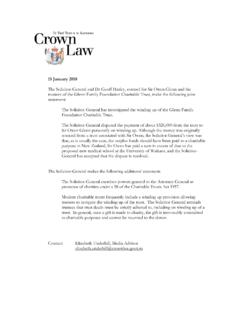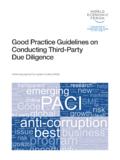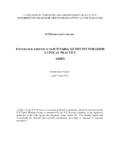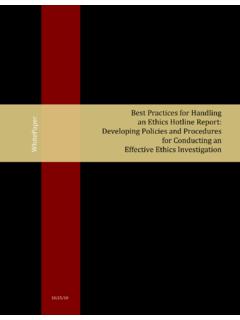Transcription of SOLICITOR-GENERAL’S PROSECUTION GUIDELINES
1 CROWN LAW SOLICITOR-GENERAL S PROSECUTION GUIDELINES As at 1 July 2013 TABLE OF CONTENTS Attorney-General s Introduction .. 1 Solicitor-General s Introduction .. 2 Definitions .. and Principles of the GUIDELINES .. with the GUIDELINES .. 4 Private prosecutions .. Supervision of Prosecutions .. Independence of the Decision-maker .. Decision to Prosecute .. 6 The test for PROSECUTION .. 6 The evidential test .. 6 The public interest 8No PROSECUTION .. for a PROSECUTION Decision .. Choice of Charges .. 11 Trying defendants or charges together .. of Charges .. of PROSECUTION Decisions .. Consents to Prosecutions .. from PROSECUTION .. by the Solicitor-General that a PROSECUTION Should be Conducted as a CrownProsecution .. Anonymity Orders .. 16 Disclosure obligations .. 16 Evidence that is not disclosed until trial .. 16 Information which the prosecutor does not intend to produce in evidence.
2 16 Previous convictions of proposed witnesses .. 17 Disclosure of any inducement or immunity given to a witness .. 17 Identity of informer .. 17 Obligations or requests under Official Information Act 1982/Privacy Act 1993 .. 17 Third party disclosure .. 18 Contempt applications .. 18 17. Case Management .. 18 18. Plea Discussions and Arrangements .. 19 19. The Prosecutor and Trial Fairness .. 20 20. Assistance to the Court .. 20 21. Prosecutors and Sentencing .. 21 22. Pre-trial Applications .. 21 23. Jury Selection .. 22 24. Proceeding in the Defendant s Absence .. 22 25. Retrials and Stay of Proceedings .. 23 26. Appeals .. 23 Consent to appeal or bring judicial review proceedings .. 23 Appeals against pre-trial 23 Appeals against sentence .. 24 Appeals on questions of law .. 24 Judicial review .. 25 27. Solicitor-General s Reference Procedure .. 25 28. Relationship between Crown Prosecutors and Enforcement Agencies.
3 26 The Police or other investigator .. 26 Recipients of advice .. 26 Serious Fraud Prosecutors Panel .. 26 Crown prosecutions .. 27 29. Victims .. 27 30. Media .. 27 PROSECUTION GUIDELINES 1 ATTORNEY-GENERAL S INTRODUCTION 1. Under our constitutional arrangements, the Attorney-General is responsible through Parliament to the citizens of New Zealand for prosecutions carried out by or on behalf of the Crown. In practice, however, the PROSECUTION process is superintended by the Solicitor-General, who, pursuant to s 9A of the Constitution Act 1986, shares all the relevant powers vested in the office of the Attorney-General. These arrangements have renewed force with the codification of the Solicitor-General s responsibility for public prosecutions in s 185 of the Criminal Procedure Act 2011. 2. Unlike most similar jurisdictions, New Zealand has no centralised decision-making agency in relation to PROSECUTION decisions.
4 In respect of Crown prosecutions, prosecutions are mainly conducted by Crown Solicitors private practitioners appointed to prosecute under a warrant issued by the Governor-General. Other prosecutions are conducted by the New Zealand Police and numerous other enforcement agencies that are responsible for enforcing a particular regulatory area. Notably, the 2011 Review of Public PROSECUTION Services did not recommend any fundamental change to these arrangements. 3. The absence of a central decision-making process underscores the importance of comprehensive GUIDELINES , and the acceptance of core PROSECUTION values. The Review of Public PROSECUTION Services also reiterated the important role the Solicitor-General s PROSECUTION GUIDELINES play in setting core and unifying standards for the conduct of public prosecutions.
5 The revised GUIDELINES reinforce the expectations that the Solicitor-General and I have of all prosecutors who prosecute on behalf of the State. 4. New Zealand is fortunate to be served by a public PROSECUTION service that is professional, open, fair and responsible. These standards will continue through the day-to-day adherence to the values reflected in these GUIDELINES . Hon Christopher Finlayson QC Attorney-General PROSECUTION GUIDELINES 2 SOLICITOR-GENERAL S INTRODUCTION 1. New Zealand s public PROSECUTION system is in the midst of significant change. The Criminal Procedure Act 2011 changes the way criminal cases proceed through the courts and imposes new obligations on all parties to conduct cases in a different way. Fiscal restraints have forced Crown Solicitors and prosecuting agencies to consider how to maintain fundamental prosecutorial standards with more limited resources.
6 2. Notwithstanding this significant change, the essentials of good PROSECUTION practice remain the same. This is reflected in these revised GUIDELINES which, in large part, continue to reflect the core principles established by the 2010 GUIDELINES . The revisions that have been made are largely those that are required to address the findings of the 2011 Review of Public PROSECUTION Services and to provide new guidance in light of the changes made by the Criminal Procedure Act 2011. 3. Revisions to reflect the Review of Public PROSECUTION Services include those that aim to reinforce the Solicitor-General s oversight of all public prosecutions. That oversight role is codified for the first time in the Criminal Procedure Act. A key way in which oversight is discharged is through these GUIDELINES , which apply more explicitly to government agencies than past versions.
7 Other revisions to reflect the Criminal Procedure Act include guidance on the approach prosecutors should take to the Act s case management process, including charge discussions, and revised guidance on appeals. 4. As noted by the Attorney-General in his introduction, the promulgation of these GUIDELINES is an important unifying force in light of the diversity of New Zealand s PROSECUTION arrangements. I am confident that adherence to these GUIDELINES by prosecutors will maintain a high quality public PROSECUTION service which has the confidence of the public, the judiciary and the legal profession now and into the future. Michael Heron QC Solicitor-General PROSECUTION GUIDELINES 3 DEFINITIONS Attorney-General: The senior Law Officer of the Crown appointed under warrant by the Governor-General. Solicitor-General: The junior Law Officer of the Crown appointed under warrant by the Governor-General pursuant to the Royal Prerogative.
8 Law Officers: The Attorney-General and the Solicitor-General. Crown Solicitors: Those who hold the warrant of Crown Solicitor for the following regions: Auckland; Christchurch; Dunedin; Gisborne; Hamilton; Invercargill; Napier; New Plymouth; Palmerston North; Rotorua; Tasman; Tauranga; Timaru; Wanganui; Wellington; Whangarei. Crown prosecutor: A Crown Solicitor or a lawyer representing a Crown Solicitor; or any other lawyer employed or instructed by the Solicitor-General to conduct a Crown PROSECUTION . Crown PROSECUTION : A PROSECUTION of a kind specified in the Crown PROSECUTION Regulations 2013, and which must be conducted by the Solicitor-General or a Crown prosecutor. Public PROSECUTION : A PROSECUTION for an offence that is commenced by or on behalf of the Crown, including a PROSECUTION commenced by a Crown entity as defined in the Crown Entities Act 2004.
9 Government agencies: All departments listed in Schedule 1, State Sector Act 1988 and Crown entities as defined in the Crown Entities Act 2004 who have the ability to commence and conduct prosecutions, and the New Zealand Police. New Zealand Police: Includes all employees of the New Zealand Police, regardless of whether they are constables as defined in the Policing Act 2008. Enforcement agencies: Includes government agencies. PROSECUTION GUIDELINES 4 1. PURPOSE AND PRINCIPLES OF THE GUIDELINES The purpose of these GUIDELINES is to ensure that the principles and practices as to prosecutions in New Zealand are underpinned by core PROSECUTION values. These values aim to achieve consistency and common standards in key decisions and trial practices. If these values are adhered to, New Zealand will continue to have PROSECUTION processes that are open and fair to the defendant, witnesses and the victims of crime, and reflect the proper interests of society.
10 Compliance with these GUIDELINES is expected in respect of public prosecutions and Crown prosecutions. However, the GUIDELINES are intended to assist all those persons whose function it is to enforce the criminal law by instituting and conducting a criminal PROSECUTION . Specifically these GUIDELINES are intended to assist in determining: Whether criminal proceedings should be commenced; What charges should be filed; Whether, if commenced, criminal proceedings should be continued or discontinued. And to: Provide guidance for the conduct of criminal prosecutions; and, Establish standards of conduct and practice that the Law Officers expect from those whose duties include conducting prosecutions. The GUIDELINES reinforce the expectation of the Law Officers and the Courts that a prosecutor will act in a manner that is fundamentally fair, detached and objective.













